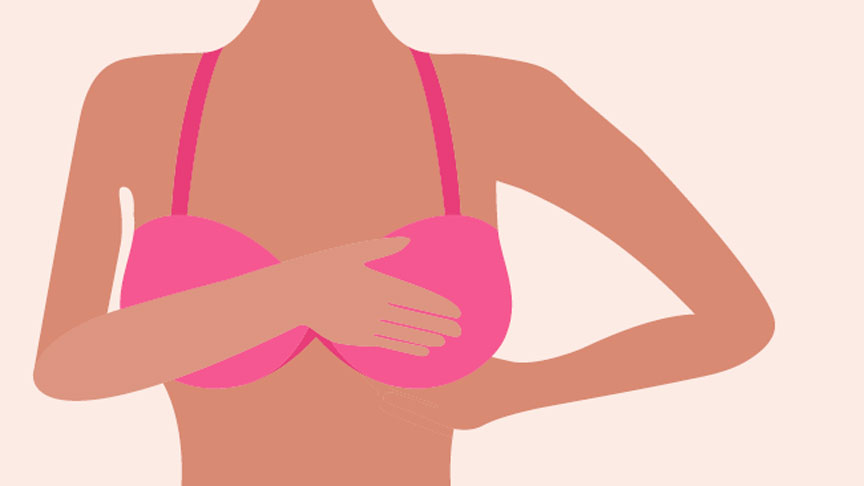
Breast cancer is the most common cancer in Australia women. It accounts for 30 per cent of all cancers in women. It’s important for all women to be breast aware, and know the possible signs and symptoms of breast cancer.
If you’re not sure what you should be looking out for when it comes to your breast health, we’ve got you covered.
How to get familiar with your breast #bebreastaware
Being breast aware is important for women of all ages. This means knowing the normal look and feel of your breasts, including the tissue above and below the breast and across into the armpit.
Remember that your breasts may look and feel different throughout your menstrual cycle, so it’s important to get familiar with how your breasts normally change throughout the month.
Keep an eye out for any of the following changes to your breasts, which may appear in one or both breasts:
- Any new lumps or lumpiness
- A change in the size of your breasts, the shape or how they sit
- A difference in your nipples like crusting, an ulcer, discharge that happens without squeezing the nipple or redness
- A newly ‘inverted’ nipple, meaning the nipple is pulled backwards into the breast
- Redness, dimpling or puckered skin on your breast
- A pain that doesn’t go away.
It can be concerning when you notice a change in your breast. Keep in mind that just because you’ve noticed a change in your breasts, this doesn’t always point to breast cancer. Most of the time, there will be a different reason for a change you have noticed. However, it is important that if you notice any of these changes, or any other unusual changes in your breasts, you see your doctor immediately, so they can rule out breast cancer and ease your mind.
Maintain your general health
Keeping healthy by maintaining a healthy weight, being physically active, eating healthy foods, limiting alcohol and not smoking can help reduce your breast cancer risk.
Breast cancer screening
It is recommended that Queensland women aged 50 to 74 years participate in BreastScreen Queensland’s free breast screening program every two years.
A breast screen (you might know it by the term ‘mammogram’) is an x-ray that can pick up small changes in breast tissue. A breast screen can pick up changes in your breast that are too small to feel or see yourself, which means it can help catch breast cancer in early stages.
You can read more about breast screening in Queensland and book your next appointment on the BreastScreen Queensland website.
Women 40 to 49 years can also access the BreastScreen program, however it does not cater for younger women for a few very important reasons:
- Younger breasts tend to have denser tissue, which makes it difficult to see breast cancer on a mammogram
- And there is no evidence that mammograms are effective in detecting early stage breast cancer in women younger than 40.
While it’s less common for women younger than 40 to get breast cancer, it’s very important for women under 40 to be aware of their breast and the symptoms and signs of breast cancer.
Separate fact from fiction
There are a number of common myths about breast cancer that have not been proven true. Women should not worry that wearing an underwire bra or being bumped on the breast will cause breast cancer.
What if I have breast implants?
Women of any age who have breast implants or who have had breast reduction surgery should still practice breast awareness and be aware of the normal look and feel of their breasts.
Women with breast implants can have mammograms. They should have regular mammograms as recommended by BreastScreen Queensland or by their doctor.
While mammograms are considered safe for women with breast implants, there is an extremely small chance that the pressure placed on a breast implant during a mammogram could cause it to rupture or leak, or could exacerbate an existing leak. Before having a mammogram, you will be provided with information about mammograms and breast implants and asked to provide additional consent to have the procedure.
What if I have a family history of breast cancer?
If you have a family history of breast cancer, which means one of more of your immediate family members has had breast cancer, book an appointment to discuss your healthcare and the best process for screening for breast cancer moving forward.
What about men?
While it’s much rarer than in women, men can also have breast cancer. It’s important that men, too, are aware of the normal look and feel of their breasts and see their doctor know if they notice any unusual changes.
Your next breast aware steps
If you are concerned about your breast health for any reason or are experiencing any worry or anxiety about breast cancer, make an appointment to talk about it with your doctor.
Our mobile women’s health nurses also provide education on breast awareness. If you have a question or concerns you’d like to discuss with them, click here for their available clinics.
If you’re aged between 50 to 74, click here to book your routine screening in. Your breast screen appointment is:
- One-on-one with a female health professional
- Will only take around 30 minutes
- Is free
- Is convenient, with more than 260 locations across Queensland - click here to find our BreastScreen van locations.